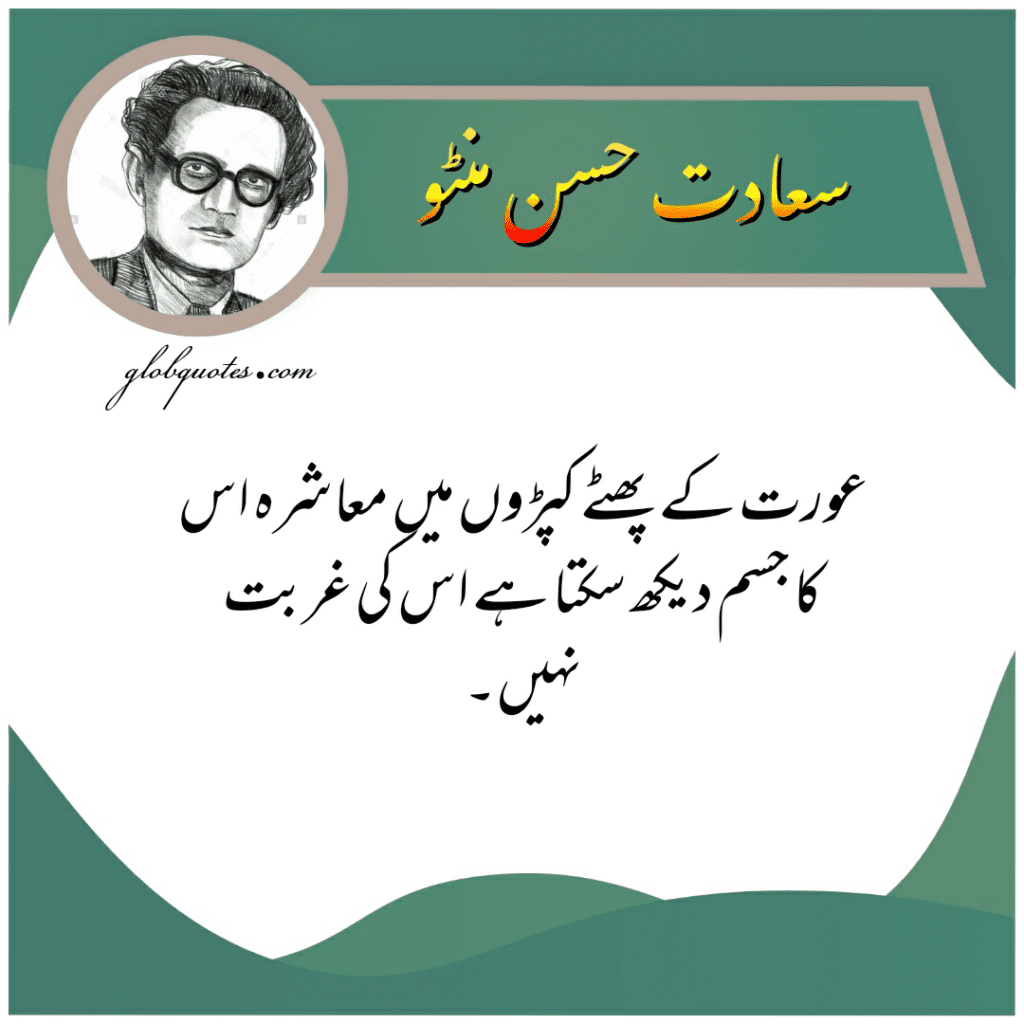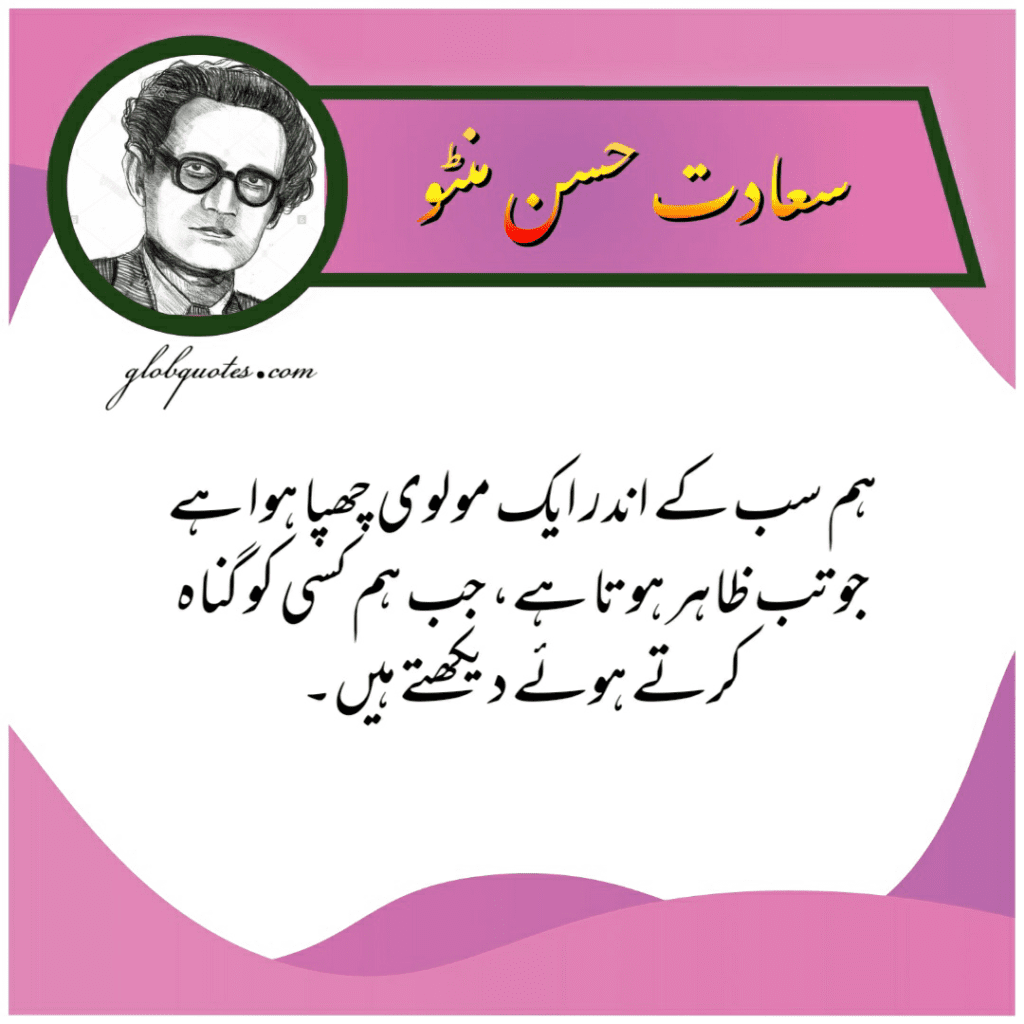Amazing Saadat Hassan Manto Quotes | منٹو کے اقوال
Introduction:
Saadat Hassan Manto quotes in Urdu, was a renowned Pakistani writer known for his honest and thought-provoking stories. His writings often depicted the harsh realities of society, challenging social norms and conventions. Manto’s work continues to inspire and resonate with readers even today. Here are some of his notable quotes that reflect his unique perspective:

“In matters of emotions, a woman is considered weak. To impose, confront, and look down upon the weak doesn’t give grace to an honorable man.”
جزبات کے معاملے میں عورت کمزور ہوتی ہے ۔ کمزور سے ضد لگانا، مقابلہ کرنا اور نیچا دیکھانا، غیرت مند مرد کو زیب نہیں دیتا ۔
This statement by Saadat Hasan Manto challenges the societal perception of women as emotionally weak and emphasizes that true honor for a dignified man. It lies in not exploiting or demeaning those perceived as weaker. Quote questions traditional gender stereotypes and expectations.

“Society can see a woman’s body through torn clothes, not her poverty.”
عورت کے پھٹے کپڑوں میں معاشرہ اس کا جسم دیکھ سکتا ہے اس کی غربت نہیں۔
This addresses the societal tendency to focus on superficial aspects. such as clothing, while overlooking the deeper issues of poverty and hardship that women may face. That points out the misplaced priorities and judgmental attitudes prevalent in society.

Some men keep their beard in the same way that prostitutes wear burqa/gown.
جس نیت سے طوائف برقعہ پہنتی ہیں کچھ مرد اسی طرح داڑھی رکھ لیتے ہیں
Saadat Hasan Manto draws a parallel between the intentions behind certain practices. Just as some women wear veils with a specific intention, Manto suggests that some men adopt beards with a similar purpose. It highlights the idea that outward appearances can be shaped by underlying motivations or intentions.
Other Blogs you may read:
Assalamualaikum Good Morning Quotes
Deep saadat Hassan Manto Quotes in urdu:
Now we are going to see saadat Hassan manto quotes in urdu, that will touch your heart.

“Within each of us, there is a Mullah (cleric) hidden, who manifests when we see someone committing a sin.”
ہم سب کے اندر ایک مولوی چھپا ہوا ہے جو تب ظاہر ہوتا ہے جب ہم کسی کو گناہ کرتے ہوئے دیکھتے ہیں ۔
Manto reflects on the human tendency to judge others while harboring flaws within ourselves. The metaphorical “Mullah” symbolizes the self-righteous aspect that becomes evident when we observe others’ faults. This highlighting the inherent contradictions and judgmental tendencies in human nature.
As long as I live, literature is my religion.
جب تک زندہ ہوں، ادب ہی میرا دین ہے۔
Reflects his deep commitment to literature. Additionally, he expresses that as long as he is alive, his devotion lies in literature. Suggesting that the pursuit and creation of literary works are akin to a spiritual or religious dedication for him. This highlights the profound significance that writing and engaging with literature held in Manto’s life and philosophy.
My goal is not to make people laugh, but to make them think.
میرا مقصد لوگوں کو ہنسی نہیں، بلکہ سوچنے پر مجبور کرنا ہے ۔
Saadat Hasan Manto conveys that his primary objective or purpose in writing is not merely to entertain or evoke laughter in people. Instead, he aims to provoke deep thought and contemplation. Manto aspires to go beyond surface-level amusement, emphasizing the importance of engaging readers intellectually. Encouraging them to reflect on the societal, cultural, or human aspects explored in his writings. This reflects his desire for literature to serve as a medium for meaningful introspection and critical thinking.

“Leaving truths unspoken is impossible for me.”
حقیقتوں کو بے لفظ چھوڑ دینا، میرے لئے ممکن نہیں ہوتا ۔
This quote expresses his inability to remain silent about truths. It reflects his commitment to addressing and revealing realities, even if it means confronting uncomfortable or challenging aspects of life through his writings.

“Facing the truth is difficult, but whoever tries to escape it is eventually caught.”
حقیقت کا سامنا کرنا مشکل ہوتا ہے ، لیکن جو حقیقتوں سے بھاگتا ہے وہ بھی آخرکار پکڑا جاتا ہے ۔
Manto acknowledges the difficulty of confronting harsh realities. However, he emphasizes that those who attempt to evade the truth will ultimately be apprehended or forced to confront it. It reflects Manto’s belief in the inevitability of facing and acknowledging the truth.

“Every dream may not be true, but every truth is not a dream.”
ہر خواب سچ نہیں ہوتا ، لیکن ہر سچ خواب نہیں ہوتا ۔
It reflects on the dual nature of dreams and truths, suggesting that not all dreams materialize into reality. This conversely, not every truth is a fantastical or desired outcome. It underscores the complexity and varied nature of both dreams and truths in life.

“Behind every truth, there is a hidden story, and within every story, there is a truth.”
ہر حقیقت ک پیچھے ایک کہانی چھپی ہوتی ہے، اور ہر کہانی میں حقیقت ہوتی پے۔
In this statement, Saadat Hasan Manto emphasizes the interconnectedness of truths and stories, suggesting that every truth is accompanied by a narrative, and every story inherently contains elements of truth.
Conclusion:
As we conclude our exploration of Saadat Hasan Manto’s aqwal, we find ourselves enriched by the profound impact of his words. Manto’s narratives are not merely stories on paper. They are windows into the human experience, boldly confronting societal norms and exposing the raw truths that shape our existence.
In a world where storytelling is both an art and a mirror, MantoManto remains a beacon, guiding us to question, reflect, and empathize. His work continues to bridge the gap between the past and present, reminding us that the essence of humanity transcends time and circumstance.
FAQs:
Q: Who is Saadat Hasan Manto?
A: Saadat Hasan Manto was a renowned Urdu short story writer born in British India in 1912. He is celebrated for his bold and realistic portrayal of societal issues, particularly during the tumultuous times of the Partition of India in 1947.
Q: What is Manto known for in his writings?
A: Manto is best known for his candid and unflinching exploring of human nature, societal norms, and the impact of political events. His stories often delve into the dark and complex aspects of life, challenging conventional narratives.
Q: How did Manto contribute to Urdu literature?
A: Manto made significant contributions to Urdu literature through his prolific short stories, essays, and sketches. He brought a unique blend of realism, satire, and social commentary to his writings, making him a trailblazer in Urdu literature.
Q: What themes did Manto frequently address in his works?
A: Manto’s works often explored themes such as partition, the human psyche, societal hypocrisy, and the impact of political events on ordinary lives. He fearlessly tackled taboo subjects and depicted the harsh realities of his time.
Q: How did Manto’s work impact society?
A: Manto’s work had a profound impact on society by challenging preconceived notions and pushing the boundaries of what will be discusse in literature. His stories prompted reflection on social issues and contributed to a more nuanced understanding of the human condition.
Q: What is the significance of Manto’s writings today?
A: Manto’s writings remain relevant today due to their timeless exploration of human experiences and societal dynamics. His work serves as a mirror reflecting the complexities of life, urging readers to engage with critical issues and question established norms.


Comments
Post a Comment